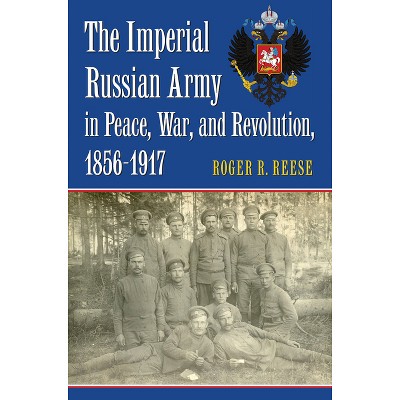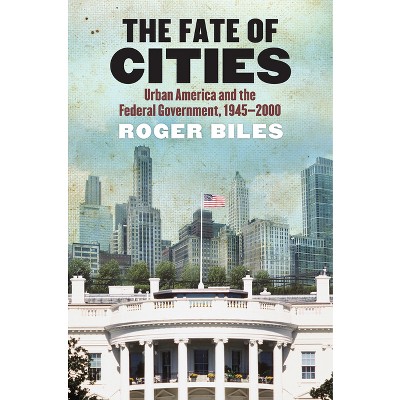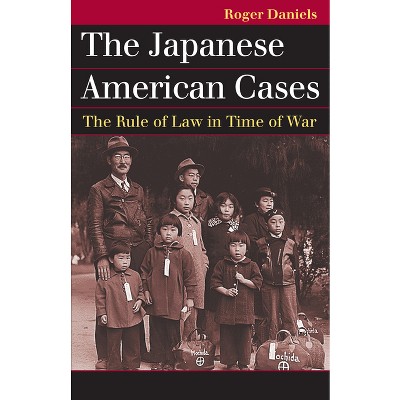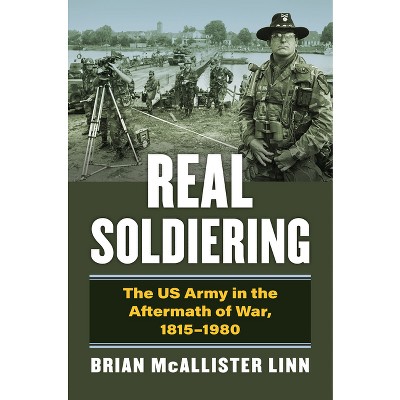Red Commanders - (Modern War Studies) by Roger R Reese (Hardcover)

About this item
Highlights
- One of the largest and most feared military forces in the world, the Red Army was a key player in advancing the cause of Soviet socialism.
- Author(s): Roger R Reese
- 330 Pages
- History, Russia & the Former Soviet Union
- Series Name: Modern War Studies
Description
Book Synopsis
One of the largest and most feared military forces in the world, the Red Army was a key player in advancing the cause of Soviet socialism. Rising out of revolutionary-era citizen militias, it aspired to the greatness needed to confront its Cold War adversaries but was woefully unprepared to change with the times. In this first comprehensive study of the Soviet officer corps, Roger Reese traces the history of the Red Army from Civil War triumph through near-decimation in World War II and demoralizing quagmire in Afghanistan to the close scrutiny it came under during Gorbachev's reform era. Reese takes readers inside the Red Army to reconstruct the social and institutional dynamics that shaped its leadership and effectiveness over seventy-three years. He depicts the lives of these officers by revealing their class origins, life experiences, party loyalty, and attitudes toward professionalism. He tells how these men were shaped by Russian culture and Soviet politics--and how the Communist Party dominated every aspect of their careers but never allowed them the autonomy they needed to cultivate a high level of military effectiveness. Despite its struggle to develop and maintain professionalism, the officer corps was often hampered by factors inextricably intertwined with the Soviet state: Marxist theory, revolutionary ideology, friction between party and non-party members, and the influence of the army's political administration organs. Reese shows that by rejecting the Western bourgeois model of military professionalism the state greatly limited its officer corps' ability to develop a more effective military. While a sense of group identity emerged among officers after World War II, it quickly lost relevance in the face of postwar challenges, especially the war in Afghanistan, which underscored fatal flaws in command leadership. Red Commanders offers new insight into the workings of a military giant and also restores Leon Trotsky to his rightful place in Soviet military history by featuring his ideas on building a new army from the ground up. It is an important look behind the scenes at a military establishment that continues to face leadership challenges in Russia today.Review Quotes
"Reese's nuanced look at Red Army motivation through the lenses of class, nationality, and gender make this an indispensable work to not only understanding Soviet military success on the eastern front, but also Soviet society under Stalin."--Army History
"Any student of civil-military relations would be well advised to read and study this book. It marks a major contribution to the literature."--Journal of Power Institutions in Post-Soviet Societies
"A well-written, enormously engaging work that shines a welcome light into a too-long-neglected area of Soviet history."--The Russian Review
"Pathbreaking. . . . In many respects this study will serve as a guide for future analyses of not just the Red Army but for many other social organizations and groups within Soviet society. . . . "--Parameters
"Should be read . . . by all serious students of the Soviet period of Russian history."--History: Reviews of New Books
"An interesting study of state and military manipulation in army growth. It addresses the social fabric of Russia in understanding how a military 'eclecticism' defined the army, and its resultant deficiencies."--Journal of Military History
"Reese challenges a key assumption concerning the effectiveness of the Soviets in war and peace. He does this by focusing on officer professionalism. . . . Reese's conclusions will contribute to a debate among historians for years to come. If scholars seek a meticulous and thought-provoking examination of the former Soviet Army, they will be well served by this book. Highly recommended."--Choice
"Reese, one of the foremost social historians of the Red Army, draws upon newly available sources from the Soviet Army archives to provide a balanced study filled with new insights."--Mark L. von Hagen, author of Soldiers in the Proletarian Dictatorship: The Red Army and the Soviet State, 1917-1930
"Reese's path-breaking work is the first comprehensive history of the Red Army as a social institution."--David Stone, author of Hammer and Rifle: The Militarization of the Soviet Union, 1926-1933
Shipping details
Return details
Trending Non-Fiction











